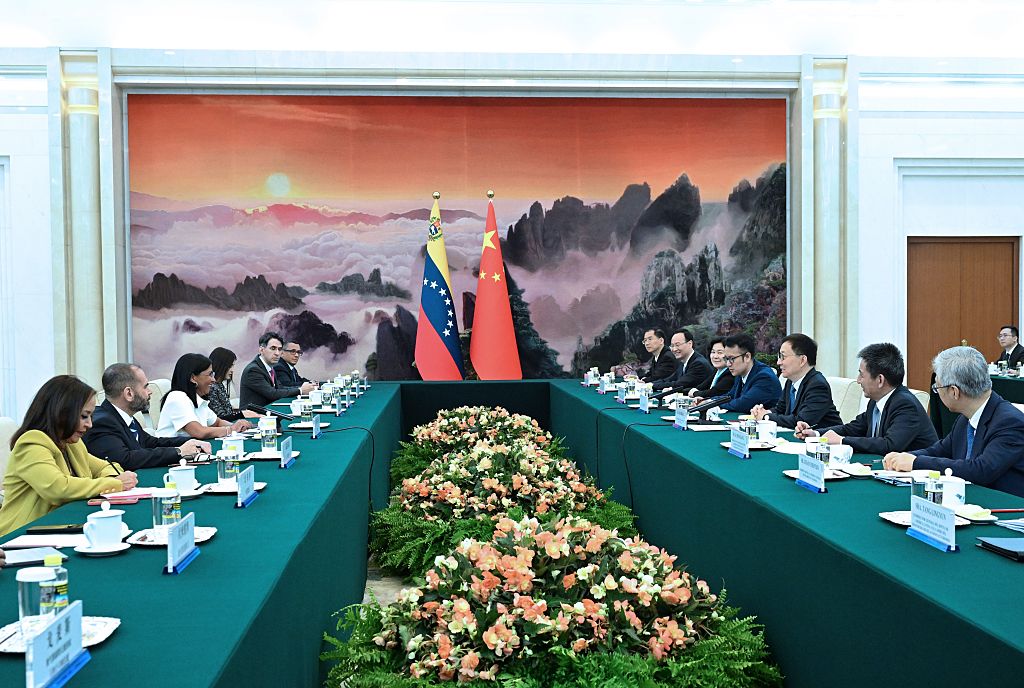
Ongoing renewed talks between the U.S. and Iran show that engagement remains a key instrument in the Trump administration’s foreign policy toolbox, even as it advances a staunch “America First” agenda. This isn’t complicity with Tehran’s regime—it’s strategic, and the move suggests that the White House continues to prioritize pragmatism over ideology. A similar principle can be applied in a case much closer to home and with significant ramifications: Venezuela.
The recent meetings between Trump special envoy Steve Witkoff and Iranian foreign minister Abbas Araghchi mark a notable step away from confrontation, signaling a preference for results over rhetoric. This approach is similar to that of the U.S. Envoy for Special Missions, Richard Grenell, who in late January traveled to Caracas and met Maduro at the Miraflores palace with a specific purpose. His engagement led to tangible results: Six American detainees were released, and Maduro resumed accepting deportation flights.
However, a month later, the Trump administration changed course, revoking Chevron’s license and cutting off state-owned oil company PDVSA’s foreign partners. In late March, a 25% tariff was imposed on countries that directly or via third parties import Venezuelan oil. Domestic politics, more than strategic foreign policy interests, may have influenced these decisions. Intense lobbying by South Florida’s congressional delegation—whose districts include large Venezuelan-exile communities—pressed the White House to punish Caracas rather than pursue engagement, and Trump depended on Representatives Mario Diaz-Balart, Carlos Gimenez and Maria Elvira Salazar to secure the 217–215 budget vote.
Now, the Trump administration is deciding what to do next with Maduro’s regime. Let’s be clear: Maduro has overseen one of the most tragic chapters in Venezuela’s history. His autocratic government must be held to account for its role in the country’s economic debacle, the ensuing humanitarian crisis and one of the largest displacements in the world today after Syria and Sudan. Yet, the U.S. currently lacks meaningful leverage to hold Maduro accountable—leverage that will more likely be gained through strategic engagement rather than continued isolation.
The isolation dilemma
Some policymakers support the maximum pressure strategy, which Trump and his team tried during his first administration. However, this approach failed to achieve its objectives and was compounded by the policy shortcomings of the Biden administration, deepening Venezuela’s economic and humanitarian crises. The approach also drove the Caribbean country further into the orbit of U.S. geopolitical adversaries.
Centered on sweeping sanctions, maximum pressure proved ineffective in steering the Venezuelan regime toward U.S. policy goals. Its failure is evident in the outcome of the July 28 presidential election, the subsequent wave of repression targeting the opposition, and the record number of political prisoners held last year.
Maintaining isolation will only deepen Venezuela’s reliance on U.S. adversaries. While the U.S. seeks to blunt China’s influence globally, forcing Venezuela to remain in Beijing’s orbit would be a strategic blunder at a time when the Trump administration is using coercive foreign policy tools as part of a proactive foreign policy approach.
As former U.S. State Department official and senior research scholar at Columbia University’s Center on Global Energy Policy Edward Fishman argues in his book Chokepoints, sanctions aimed at regime change often inflict more harm on civilians than on authoritarian leaders. In Venezuela, sanctions have ceded ground to U.S. adversaries in its own hemisphere. Fishman doesn’t oppose pressure outright but underscores the strategic value of pairing it with incentives to shape state behavior.
After more than a decade of economic coercion, the U.S. has little to show for its efforts in Venezuela—reminiscent of the more than 60 years of embargoes and the “special period” designation that have failed to democratize Cuba under the Castros and now with Miguel Díaz-Canel. Cuba’s experience starkly illustrates the limits of coercion and underscores the need for a pragmatic, engagement-based strategy if Washington truly seeks change in Caracas. With Venezuela sitting atop the world’s largest proven crude oil reserves—resources that increasingly fuel the U.S.’s strategic rivals—the stakes are higher than ever, making a recalibrated approach all the more imperative.
Recalibration
It’s time to recalibrate. The next major test lies with Chevron’s operations in the country. Revoking its license marked a more extreme step than even the Trump administration’s first-term policies. It signaled a win for China and Russia, both of which are eager to expand their presence and growing influence in Latin America.
Last month, Venezuela ordered Chevron to return nearly 1 million barrels of Venezuelan oil to PDVSA that the U.S. firm was working to secure before wrapping up its operations later this month. That oil will now likely be heading to China. Venezuela is redirecting oil exports to China (already its largest crude buyer) at steep discounts, and Beijing is reportedly eyeing Chevron’s assets should Washington force an exit.
U.S. energy interests, too, would suffer. Losing the potential for accessing Venezuelan crude undermines domestic refining interests and will continue pushing fuel prices upward—hardly a win for “America First.” Political fallout could be swift with U.S. midterm elections ahead in November 2026.
Constructive engagement is not capitulation. It’s the practical path forward. Engagement must consider concrete benchmarks and mutual interests rather than open-ended dialogue or pursuing demands that the other side is unwilling to concede. In the short term, Washington should focus on acquiring leverage on the ground through a more robust non-U.S. government presence. It should press Caracas for reliable transit corridors for U.S.-bound crude and create parallel humanitarian channels to deliver food and medicine directly to needy communities, with clear, time-bound metrics for distribution. Over the longer term, the U.S. should insist on tangible steps toward political pluralism while supporting PDVSA’s institutional modernization and anti-corruption safeguards.
If Trump leans into his realist instincts, he’ll see the strategic logic: Venezuelan oil flowing to the U.S., not China; reinforcing U.S. primacy in Latin America; and managing migration through negotiated deportations. These three outcomes—interconnected and achievable—would be a foreign policy win for the White House.






